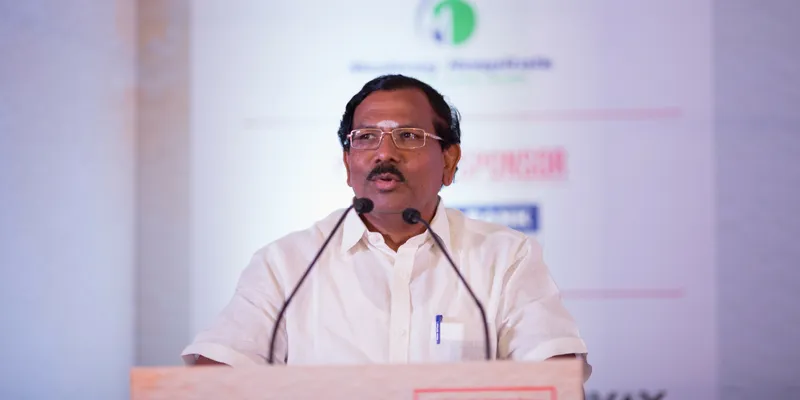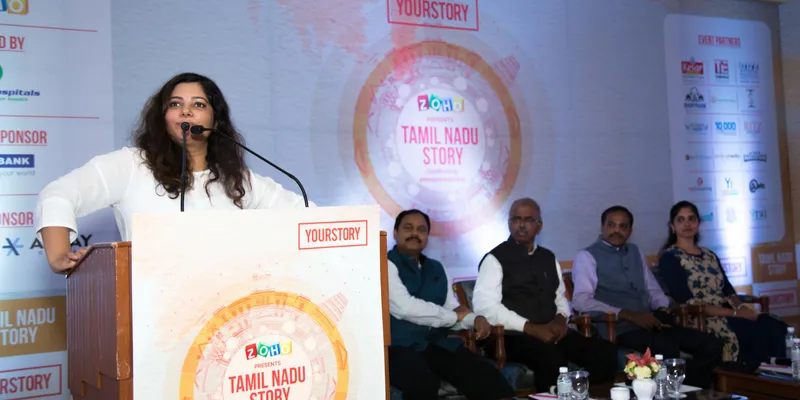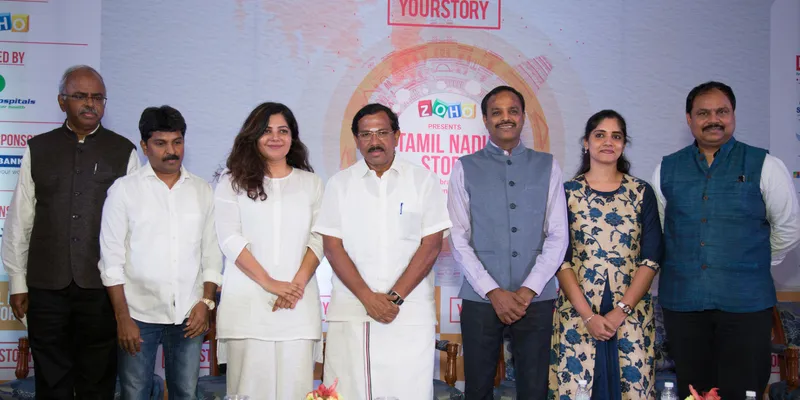Tamil Nadu Story – understanding the Tamil Nadu ‘State of Mind’
YourStory launched Tamil Nadu Story amid much fanfare on August 3, 2018. What makes Tamil Nadu special?
Ma Foi Pandiarajan, the State Minister of Tamil Official Language and Tamil Culture, presiding over the launch, said CII Tamil Nadu undertook a brand-building exercise for Tamil Nadu to bolster its image and came up with the tagline ‘State of Mind’, that puts stress on the cerebral over the financial. Pandiarajan, a successful entrepreneur and Founder of HR firm Ma Foi, gave a sweeping overview of enterprise in Tamil Nadu, with its rich and varied capability and regional niche.
Thyrocare Founder A. Velumani, Bharat Matrimony Founder J. Murugavel, Naturals Co-founder C.K. Kumaravel, Shriram Properties MD and CEO M. Murali, and Zoho’s Chief Evangelist Kuppulakshmi presented their own stories, telling the audience what propelled them to success.
Pandiarajan said that Tamil Nadu entrepreneurs don’t focus much on scale, but go deep, slightly modifying the triple constraint triangle of project management. Many have a ‘tiger-embrace’ mindset (an allegory to a native word where the tiger tightly embraces its cub without letting it go independent) of not letting go of control or stake, and refusing to share their business expertise with strategic stakeholders, the minister pointed out. He also spoke of how time-honoured tradition has spawned industry in Tamil Nadu by quoting the example of a nearly 2,000-year-old practice in Rameswaram of making bangles out of conch shells.

Several industrial clusters, such as the textile cluster in Erode/Tirupur and a mosquito net cluster near Karur, make the state’s entrepreneurial activity special.
YourStory Founder Shradha Sharma said that entrepreneurs in this part of the country don’t thump their chests or shout from the roof. So launching Tamil Nadu Story is an endeavour to bring to surface those stories waiting to be told about Tamil Nadu.
Tamil Nadu’s emphasis is different from the rest of India, and its strokes paint a varied hue. The new-age nomenclature such as startups, scaling, and fundraising could not be templated to capture the entrepreneurial spirit of Tamil Nadu. Though historically the state boasts of many native traditions in trading activity and production, entrepreneurs who are engaged in them rarely speak out. A culture of quiet excellence is embedded in the ethos of practice in the state. Though the press has reported on stellar success stories, they only appear in bits and pieces, while in reality, the international reach of a range of industries in Tamil Nadu is astounding.
For example, the Aachi and Sakthi groups, which manufacture cooking and edible products, came into the limelight only after they reached a massive scale. Efforts by the CII Tamil Nadu chapter and TiE Chennai were only partially successful in bringing to the surface the entrepreneurs who deserve to be appreciated. Both these ecosystem organisations couldn’t make much headway. As a result, entrepreneurs quietly carry on the glory on their shoulders, without publicising it.

Tamil Nadu ranks among the best in the country in terms of quality of enterprises and ethical practices. Auto components for a majority of global automakers are produced by the TVS group. The Amalgamations group, founded by the legendary entrepreneur Anantharamakrishnan, also has a fair share of global reach. Its flagship company TAFE, which manufactures tractors, is the second largest manufacturer in India and one of the largest in the world. The Murugappa group’s diversified businesses make it one of the largest groups in terms of size and scale, and the group has an impressive 200-year-plus history.
Textile machinery from Coimbatore has a worldwide reach. Tirupur’s garment industry is well known for its global presence. Industrial clusters in several parts of the state have an export component built into them. The one reason for Tamil Nadu’s overall development is the presence of some form of skill, which has become an industry over time, scattered across the state. Industrial hubs focused on a particular sector are present in the state – Chennai for auto components, Coimbatore for textile machinery and pumps, Tirupur for cotton garments, and Erode and Karur for textile accessories, to name a few.
Industrial activity in Madras Presidency started during the British times. Out of the Big Three of the British era – Arbuthnot & Company, Binny & Company, and Parry & Company – only Parry’s has survived. The governments in the state post-Independence gave a thrust to industrial activity. Chief Minister K. Kamaraj is credited with bringing in industry-friendly policies. The Industry Minister in his cabinet, R. Venkataraman, who later became President of India, pioneered the concept of ‘industrial estate’ in the state, making it easy for many small-scale industries to flourish.

Minister Pandiarajan said that the industrial estate concept was conceived in Tamil Nadu, which later spread to other parts of the country.
Sushila Ravindranath, a senior business journalist, in her book Surge: Tamil Nadu’s Growth Story, captures the history of industrial activity in the state. Regional parties have ruled the state since 1967, changing the dynamics. Sushila says that the distance from Delhi, the Centre’s lack of interest due to the dominance of regional parties, and companies not rushing to the stock market unlike their counterparts in North India make it seem that Tamil Nadu is not an industrially advanced state. The licence-permit raj of the 1970s didn’t suit the Tamil Nadu entrepreneur.
Their inability to wheel-and-deal in Delhi, and possibly a lack of speaking knowledge of Hindi, did mean industrial activity was low till 1991, when economic liberalisation infused fresh life into the industry. The manufacturing sector, which formed the backbone of Tamil Nadu’s industrial activity, sprang to life again, this time going global. TVS group company Sundram Fasteners, manufacturers of nuts and bolts for automakers, for example, has grown tremendously and gone on to establish two plants in China. Sanmar group, specialising in chemicals and engineering, also caters to the global customer base.
Like in the rest of India, many companies are family-controlled in TamilNadu, with little investment from outside. Mallika Srinivasan, Chairperson and CEO of TAFE, told a TiE Chennai audience a few years ago that the Amalgamations group doesn’t go public with information about the group companies. This mindset has been largely the slant of the majority of industrialists and entrepreneurs in the state.
Freshworks, founded by Girish Mathrubootham and Shan Krishnaswamy, is the first technology enterprise from Tamil Nadu to get the billion-dollar valuation, making it a unicorn. But there are also manufacturing giants who are in the unicorn league. The advent of social media or Internet-based reporting and news sites has not changed the scenario. In this context, Tamil Nadu Story endeavours to capture the entrepreneurial spirit of the state and take it to the world.
Venkatesh Krishnamoorthy is the Founder of VirtualPaper.
(Disclaimer: The views and opinions expressed in this article are those of the author and do not necessarily reflect the views of YourStory.)







